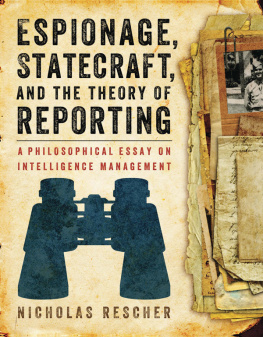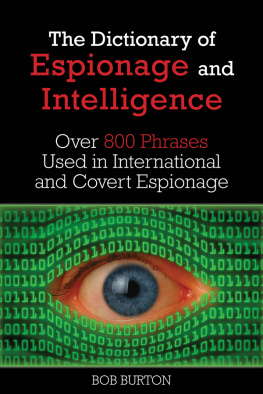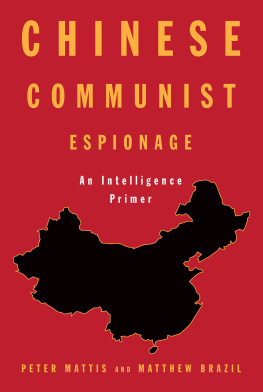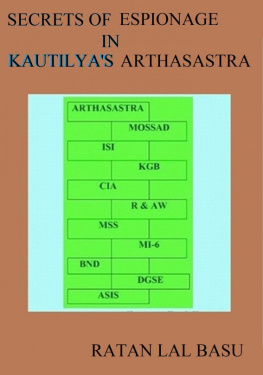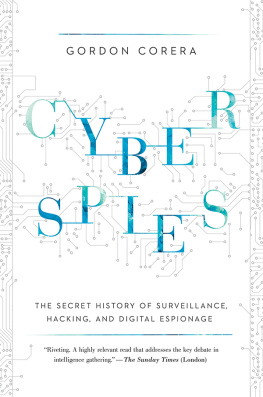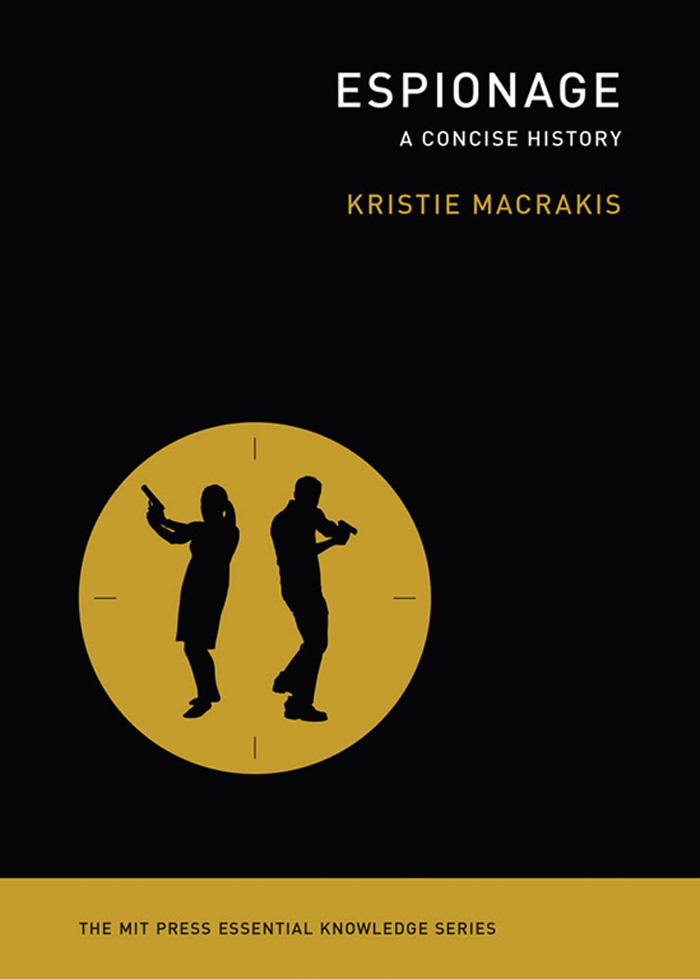
Espionage
The MIT Press Essential Knowledge Series
A complete list of books in this series can be found online at https://mitpress.mit.edu/books/series/mit-press-essential-knowledge-series.
Espionage
A Concise History
Kristie Macrakis
The MIT Press|Cambridge, Massachusetts|London, England
2023 Massachusetts Institute of Technology
All rights reserved. No part of this book may be reproduced in any form by any electronic or mechanical means (including photocopying, recording, or information storage and retrieval) without permission in writing from the publisher.
The MIT Press would like to thank the anonymous peer reviewers who provided comments on drafts of this book. The generous work of academic experts is essential for establishing the authority and quality of our publications. We acknowledge with gratitude the contributions of these otherwise uncredited readers.
This book was set in Chaparral Pro by New Best-set Typesetters Ltd.
Library of Congress Cataloging-in-Publication Data
Names: Macrakis, Kristie, author.
Title: Espionage / Kristie Macrakis.
Description: Cambridge, Massachusetts ; London, England : The MIT Press, [2023] | Series: The MIT Press Essential Knowledge Series | Includes bibliographical references and index.
Identifiers: LCCN 2022033269 (print) | LCCN 2022033270 (ebook) | ISBN 9780262545020 (Paperback) | ISBN 9780262372992 (epub) | ISBN 9780262373005 (pdf)
Subjects: LCSH: EspionageHistory.
Classification: LCC JF1525.I6 M2326 2023 (print) | LCC JF1525.I6 (ebook) | DDC 327.12dc23/eng/20221021
LC record available at https://lccn.loc.gov/2022033269
LC ebook record available at https://lccn.loc.gov/2022033270
10987654321
d_r0
For Murphy Macrakis (20092022)
Contents
Series Foreword
The MIT Press Essential Knowledge series offers accessible, concise, beautifully produced pocket-size books on topics of current interest. Written by leading thinkers, the books in this series deliver expert overviews of subjects that range from the cultural and the historical to the scientific and the technical.
In todays era of instant information gratification, we have ready access to opinions, rationalizations, and superficial descriptions. Much harder to come by is the foundational knowledge that informs a principled understanding of the world. Essential Knowledge books fill that need. Synthesizing specialized subject matter for nonspecialists and engaging critical topics through fundamentals, each of these compact volumes offers readers a point of access to complex ideas.
INTRODUCTION
My goals are modest: to introduce you to the secret world of espionage so that you have a better understanding of what it is, what role it plays in international politics, and how it is carried out by people and technology in historical perspective. This is not a book about how to become a spy. But after reading about real spies and the methods they used, you will better understand who spies are, why they spy, how they spy, and how they have been viewed in various societies. This book concentrates on the craft of espionage while using historical examples to illustrate how espionage was used in actual operations.
How important is espionage in international affairs and war? Every reader will come away with their own impression of its value. At the end of the last chapter, I raise some questions about the size of the contemporary enterprise and whether the game is worth the candle.
Espionage is among the oldest of human activities. It has been called the worlds second-oldest profession, following prostitution. But espionage did not really become a profession until the early twentieth century with the emergence of intelligence agencies. Spying, of course, because of its association with human activity since time immemorial, does have a long secret history, one marked by betrayal and deception. This small book reveals and distills the essential features of espionage in historical perspective. It is thematically organized rather than chronologically, selective rather than comprehensive.
A number of themes and issues run through the text. I contend that the practice of espionage mirrors human society, with the added cloak of secrecy and deception. Therefore, it is not surprising that spying extends back to ancient societies, even if it was not institutionalized into bureaucracies until the twentieth century. Factors that motivate ordinary people to become spieslike money, ideology, and egomotivate people in general. But not everyone with human weaknesses and foibles becomes a spy. Similarly, duplicity and betrayal, two key features of espionage, exist in society, but they are magnified and more frequent in the world of espionage. Just as marital infidelity is betrayal, so also is spying against ones country. The main difference is that spies are professional betrayers.
The theme of betrayal has entered some of the more sophisticated spy novels of the twentieth century, like those of John Le Carr. Le Carr often took real-life spy cases and fictionalized them, but the public at large has often taken such works of spy fiction as fact. Their image of the spy and the secret world of espionage is often formed by fictionalized spies like James Bond, Jason Bourne, or those in Le Carrs novels. Therefore, the dialectic between image and reality or the duality of fact and fiction is an ever-present theme.
The practice of espionage mirrors human society, with the added cloak of secrecy.
Two features distinguish my little book from other, longer, surveys of espionage. First, although several general histories of espionage have been written (see the notes and further reading sections at the end of this book), there is no concise introduction to its anatomy and history. Second, I include discussions of technology as a tool of espionage and a type of espionage. It is surprising how often industrial espionage is excluded from general surveys of the history of espionage as a discrete topic, even if the role of espionage in the Cold War arms race to develop nuclear weapons is included. Industrial and atomic espionage are as important as diplomatic and military intelligence and deserve a chapter of their own.
Similarly, espionage has traditionally been understood to be about human spies, but since the beginning of the twentieth century technology has increasingly become a substitute for the collection of secret information by humans. Technological sophistication changed the tools of the trade for gathering and communicating secrets. This is also a mirror of society: agile spy agencies will adapt to changing times. Just as the world increasingly turned to the internet and computers in the late twentieth and early twenty-first centuries, so too was there an increase in cyber-spies and cyber-spying.
Along with increasing technologization of espionage came increasing professionalization, which produced the spy bureaucracies of the twentieth and twenty-first centuries. Historically, spy bureaucracies have expanded in response to crises like the attacks on Pearl Harbor and the World Trade Center in the United States. The mega-bureaucracies, mushrooming budgets, and sprawling buildings that sprouted in post-9/11 America are unprecedented, and it is not clear how or if they will shrink in size.
1
What Is Espionage?
Put simply, espionage is stealing secrets using a spy. Those secrets usually come from foreign countries if a government or intelligence agency is involved. As the British Secret Intelligence Service (SIS) officer turned KGB spy (Komitet Gosudarstvennoy Bezopasnosti, which translates to Committee for State Security in English) Kim Philby put it, the SISs job was to collect secret information from foreign countries by illegal means. But espionage can also occur outside the government or domestically, most notably in industrial espionage, in which companies collect secret or proprietary information from other companies. Whether state sponsored or commercial, the focus of espionage is on the
Next page


